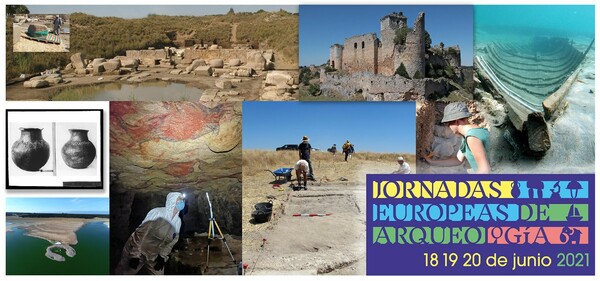The European Archaeology Days (EAD):

© Ministry of Culture and Sports, Government of Spain
Since 2010, the French Ministry of Culture has placed the co-ordination and promotion of France’s National Archaeology Days (JNA) in the hands of the National Institute for Preventive Archaeological Research (Inrap).
These three days will be used to raise awareness and familiarize European audiences with all aspects of archaeology. A range of original and festive events will be organized, to allow families, schools, students, history enthusiasts or the merely curious to discover their archaeological heritage. Visits to places that are not normally open to the public (excavation sites, research centers, archaeological collections, etc.), meetings with archaeological professionals (archaeologists, researchers, etc.), who will be describing their profession to the public, along with a range of entertaining and educational activities (an introduction to excavation, demonstrations, workshops, etc.), are just some of the wide variety of programs available at the European Archaeology Days.
The JNA expanded to Europe in 2019. For the first time, seventeen countries participated.
In 2020, France's National Archaeology Days became the European Archaeology Days.
In light of the COVID-19 epidemic , the 11th edition of the European Archaeology Days (EAD) did not take place in its traditional form. Nevertheless, to celebrate archaeology with all publics, Inrap launched, under the aegis of the Ministry of Culture, the event #Archeorama. In addition to events with the public when the health situation permitted, the #archeorama event opened up the possibility of creating digital events and enhancing online resources: live meetings of archaeologists on social networks, publication of new videos, live lectures, virtual tours of exhibitions, 3D modelling of archaeological objects and sites, etc.
With more than 1,400 initiatives in Europe and 26 European countries participating, the 2021 European Archaeological Days were a tremendous success! Europe’s countries came out in full force for this year’s event, once again, offering more than 830 initiatives, signing the success of these days. More than 570 events took place all over France: excavation sites exceptionally opened to the public, educational and fun activities, archaeology villages, meetings with researchers, visits to laboratories, exhibitions, screenings... Throughout the three days, the public had the opportunity to take in an abundant programme offered by all those who make archaeology today.
The "#ArchaeologyBehindtheCurtain” operation was a resounding success, with 32 new events all over France, giving the public the chance to experience places or collections that are usually off-limits: museum reserves, behind-the-scenes exhibitions or laboratories, creative workshops, museums in the making, and more.
Video: an introduction to ceramology workshop for schoolchildren; children dig up ceramic shards that need to be reassembled in order to discover an object.
National Institute of Preventive Archaeological Research (Inrap):
Created by the 2001 Act on Preventive Archaeology, the National Institute for Preventive Archaeological Research is a French public establishment under the authority of the Ministries of Culture and Research. Its 2,200 agents, spread across eight regional and interregional departments, 42 research centres and a head office in Paris, make it the largest European archaeological research operator.
It identifies and examines archaeological heritage prior to land development. It is empowered across the territory, for all periods, from prehistory to the present day. It conducts its work in all types of contexts: urban, rural, subaquatic and subsea, motorway and rail routes, electricity or gas grids.
As a national research institute, it carries out around 1,800 archaeological surveys and 200 excavations each year, on behalf of private and public developers in mainland France and its overseas territories.
Upon conclusion of the projects, INRAP analyses and interprets the excavation data and makes it available to the scientific community. The leading producer of archaeological data and publications in France and Europe, the Institute makes a decisive contribution to the development of archaeological and historical knowledge as well as to the major issues of our times: migration, climate, environment, health, knowledge of territories, economy, etc.
Its remit also includes the dissemination of archaeological knowledge to the widest possible audience. In this capacity, it organises numerous outreach operations, most often in collaboration with developers: site tours, exhibitions, publications, audio-visual content, and conferences. Every year on the third weekend of June, across the national territory and in the Member Countries of the Council of Europe, it organises the European Archaeology Days under the aegis of the Ministry of Culture in partnership with public cultural and scientific institutions and local authorities.
Event objectives
The European Archaeology Days (JEA) encourage public authorities and archaeology stakeholders to promote archaeological heritage. They are based on a digital platform, journees-archeologie.fr, bringing to the attention of the public the multiplicity and diversity of heritage and initiatives relating to archaeology in Europe. They facilitate the creation of a network of archaeology stakeholders in all member countries of the Council of Europe.
The main objectives of the JEA are to:
- raise awareness among European citizens of the richness and cultural diversity of Europe;
- make archaeology more visible to different audiences and the media;
- make the general public and the political authorities aware of the need to protect archaeological heritage;
- to enable the public to grasp the mosaic of Europe’s cultures;
- attract new audiences who are not accustomed to visiting the places where archaeology is carried out;
- promote to the public the entire archaeology operating chain, "from dig to museum”;
- promote the sharing of knowledge between archaeology professionals and European citizens.
To this end, the JEA take place every year on the third weekend of June in all member countries of the Council of Europe.

